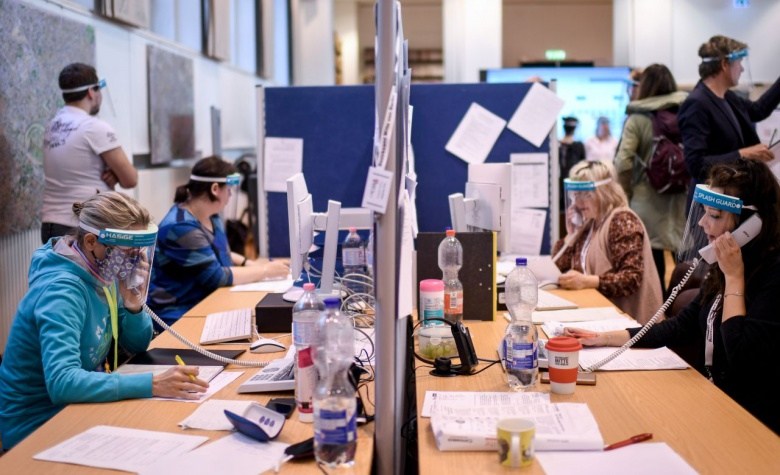From Monday 4 May, when the first phase out of Belgium's lockdown started, the "corona detectives" started their work, but what does that mean, in practice?
Pilot phases started in the three regions, despite some initial issues with the recruitment of the Flemish tracers. In total, Belgium will employ 2,000 tracers who will work in call centres, split up between the regions, with 200 set to be put to work on Brussels, 600 in Wallonia and 1,200 in Flanders.
Contact tracing is an important part of the Belgian exit strategy to gradually lift the coronavirus lockdown measures. It is up to each Region how they decide to staff their call centres, but there will be a common digital platform, provided by the federal government.
The detectives will then trace the people who have been in contact with confirmed or suspected patients with the new coronavirus (Covid-19). The identified people will be tested for the virus, and those who test positive will have to go in quarantine for two weeks.
People receiving such a phone call will be asked to indicate who they have been in close contact with recently, of will be notified that they themselves have been in contact with an infected person. The emphasis will be on the contacts up to two days before you began to feel ill, as well as the following week, according to the authorities.
Anyone who has been tested can be asked by their doctor to keep a contact form with them. This way, contact tracing will start even before you get a call from the call centres.
This contact form can be found here and can be filled out by anyone who wishes to do so. It aims to help people keep track of the people we have been in (close) contact with, and also asks if there was "physical contact," for example.
If a person tests positive, they will be called by a contact tracer to go over the contacts on the form, and in turn, contact those persons to inform them that they have been in contact with an infected person.
Related News
- Tracing: Belgians urged to keep track of their close contacts
- ‘Quarantine certificates’ to be issued by Belgian doctors
- Coronavirus: Brussels pilots contact tracing team
On Sunday evening, microbiologist and former inter-federal Covid-19 spokesperson Emmanuel André, who heads the tracing committee, tweeted a request to keep "a kind of logbook" of your contacts, with their telephone numbers, to make the tracers' work easier.
"It will be useful if people want to do that," Joris Moonens, spokesperson of the Care and Health Agency, told VRT. "But we cannot make that compulsory," he added.
People who have been in close contact with an infected person will be asked to isolate themselves at home for two weeks, and the measure their temperature twice a day. Leaving the house to for essential journeys, such as to the supermarket or the pharmacy, is still allowed, but wearing a face mask at all times will be mandatory.
What about privacy?
The tracers in call centres will only get the necessary data to make the calls. In practice, they will know a name, telephone number, and the information about which scenario they have to follow (if they are calling an infected person, or someone who has been in contact with one, etc).
The contacts on someone's list will not be given the identity of the infected person they have been in contact with, and the tracers are bound to secrecy as well.
"This data is stored in a private cloud," Frank Robben of the Crossroads Bank Social Security, who helped to set up the system, to VRT.
The information that the tracers receive is stored, together with all other data, in a secure database on the computers of the National Research Institute Sciensano. In these databases, the information from people tested in labs, hospitals, and sometimes also general practitioners, are also kept there.
If the information is used for scientific research, it cannot be reduced to a single person, and will be deleted after the pandemic, according to Robben.
Additionally, the information provided will at no time be used to check whether someone is complying with the measures, and is also not shared with the police, justice or other control services.
Maïthé Chini
The Brussels Times

